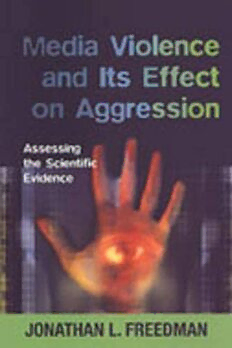
Media Violence and its Effect on Aggression: Assessing the Scientific Evidence PDF
Preview Media Violence and its Effect on Aggression: Assessing the Scientific Evidence
MEDIA VIOLENCE AND ITS EFFECT ON AGGRESSION: ASSESSING THE SCIENTIFIC EVIDENCE In this controversial work, Jonathan Freedman argues that the scientific evidence does not support the notion that exposure to TV and film vio- lence causes aggression in children or adults. Based on his findings, far fewer than half of the scientific studies have found a causal connection between exposure to media violence and aggression or crime. In fact, Freedman believes that taken to an extreme, the research could be inter- preted as showing that there is no causal effect of media violence at all. Media Violence and Its Effect on Aggression offers a provocative chal- lenge to popular wisdom and various public statements by professional and scientific organizations. Freedman begins with a comprehensive review of all the research on the effect of violent movies and television on aggression and crime. Having shown the lack of scientific support for the prevailing belief that media violence is connected to violent be- haviour, he then explains why something that seems so intuitive and even obvious might be incorrect, and provides plausible reasons why media violence might not have bad effects on children. He contrasts the supposed effects of TV violence on crime with the known effects of pov- erty and other social factors. Freedman concludes by noting that although in recent years televi- sion and films have been as violent as ever and violent video games have become more and more popular, there has been a dramatic decrease in violent crime. He argues that it is thus unlikely that media violence causes an increase in aggression or crime and that both increases and decreases in violent crime are the result of major social forces. JONATHAN L. FREEDMAN is Professor of Psychology at the University of Toronto. This page intentionally left blank JONATHAN L. FREEDMAN Media Violence and Its Effect on Aggression: Assessing the Scientific Evidence UNIVERSITY OF TORONTO PRESS Toronto Buffalo London University of Toronto Press 2002 Toronto Buffalo London Printed in the U.S.A Reprinted 2003,2006,2013 ISBN 0-8020-3553-1 (cloth) ISBN 0-8020-8425-7 (paper) Printed on acid-free paper National Library of Canada Cataloguing in Publication Data Freedman, Jonathan L. Media violence and its effect on aggression : assessing the scientific evidence Includes bibliographical references and index. ISBN 0-8020-3553-1 (bound). ISBN 0-8020-8425-7 (pbk.) 1. Violence in mass media - Psychological aspects. 2. Aggressiveness in children. I. Title. P96.V5F73 2002 155.4'018232 C2001-903806-2 This book has been published with the help of a grant from the Humanities and Social Sciences Federation of Canada, using funds provided by the Social Sciences and Humanities Research Council of Canada. The University of Toronto Press acknowledges the financial assistance to its publishing program of the Canada Council for the Arts and the Ontario Arts Council. University of Toronto Press acknowledges the financial support for its publishing activities of the Government of Canada through the Book Publishing Industry Development Program (BPIDP). To Rona and Jacob This page intentionally left blank Contents PREFACE IX ACKNOWLEDGMENTS xiii 1 Villain or Scapegoat? Media Violence and Aggression 3 2 Method 22 3 Survey Research: Are Exposure to Media and Violence Related? 33 4 Laboratory Experiments: Controlled Research in the Laboratory 47 5 Field Experiments 85 6 Longitudinal Studies: The Effect of Early Exposure to Violent Media on Later Aggression 108 7 With and Without Television: Comparing Communities That Have and Do Not Have Television 135 8 Other Approaches to Assessing Causality 160 9 Desensitization: Does Exposure to Media Violence Reduce Responsiveness to Subsequent Media Violence and/or Real Violence? 176 10 Summary and Conclusions 194 REFERENCES 211 INDEX 223 This page intentionally left blank Preface Many people are convinced that media violence is harmful. They be- lieve that exposure to this kind of violence causes children and perhaps also adults to become more aggressive and even to commit violent crimes. This belief has been fostered and supported by some psycholo- gists and representatives of health organizations, who have claimed that the scientific research has proven that media violence has this effect. As I shall attempt to show in this book, this is not correct. There is a considerable amount of research on the topic, and contrary to these claims, the results of the research generally do not demonstrate that exposure to media violence causes aggression. For many years I followed the debate about media violence at a distance, without conducting any research or writing any articles on the topic. I got involved largely by accident. When I first came to the University of Toronto, some graduate students wanted me to teach a seminar. I wanted a topic that would involve many different kinds of research and that would also be inherently interesting. I chose televi- sion violence because it met these criteria, and also because I knew relatively little about the research and could thus start at about the same point as the students. I had read some of the research and was somewhat sceptical of the claims that had been made about it, but I had no fixed ideas about the subject. The class was attended by five graduate students, and between three and five faculty members sat in on each session. We read quite a lot of the research during the term. Each week, we read several papers, ana- lysed them, and discussed the results. As the term progressed, we were all surprised to find that the research often did not show what it had been described as showing. Many studies that were typically cited as
